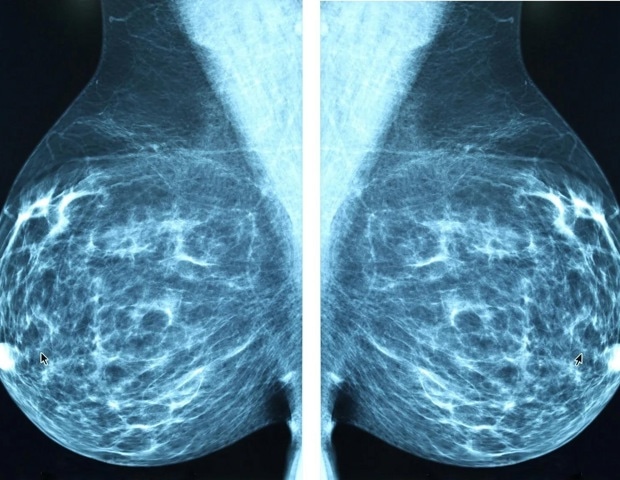Health
Researchers Develop Sugar-Coated Nanoparticles to Combat Cancer

Recent research from the University of Mississippi indicates a promising new approach to treating triple-negative breast cancer, a particularly aggressive form of the disease. The study, published in the journal Advanced Healthcare Materials, demonstrates that coating nanoparticles with a sugar-like substance can enhance their effectiveness in targeting cancer cells.
Triple-negative breast cancer is defined by the absence of three common receptors: estrogen, progesterone, and the HER2 protein. This makes it resistant to many traditional therapies and contributes to its higher mortality rate. Notably, it disproportionately affects young women and is more prevalent among Black and African American women. According to a report from the University of Mississippi Medical Center, from 2016 to 2023, approximately 37% of breast cancer cases treated at the center were triple-negative, significantly exceeding the national average.
Innovative Drug Delivery Mechanism
Researchers have found that triple-negative breast cancer cells overexpress glucose transporters, allowing them to absorb higher levels of sugars. This characteristic led the team to explore a novel drug delivery method. “Essentially, it has a sweet tooth. So, how can we get it to take its medicine? We wrap it in sugar,” said Eden Tanner, assistant professor of chemistry and biochemistry.
The sugar-coated nanoparticles function by “tricking” cancer cells into absorbing the medication. Mira Patel, a junior chemistry major involved in the study, explained, “The drug itself is encapsulated in the nanoparticle, which is then coated in glucose.” When injected into the bloodstream, these particles can attach themselves to red and white blood cells, effectively traveling throughout the body until they reach the cancer cells.
By utilizing this method, researchers aim to enhance the affinity between the nanoparticles and the cancer cells due to the overexpression of GLUT-transporters. This could lead to more targeted treatments that spare healthy cells while delivering cancer therapies directly to tumor sites. Patel stated, “This method could provide something that will change the way we treat this cancer in the future.”
Potential for Broader Applications
While the focus of this research is on triple-negative breast cancer, the implications extend to other diseases that also overexpress glucose transporters, such as colon cancer, brain cancer, and fatty liver disease. Tanner noted, “We haven’t tested the technology on those other diseases yet, but there’s a good reason to believe that a similar strategy might work.”
Before this innovative treatment can be widely implemented, further testing is needed to evaluate its effectiveness in real-world disease conditions. Given the high prevalence of triple-negative breast cancer in Mississippi, the outcomes from this research could have a significant impact on local patient care.
“One of our strongest motivations as a research group is to think about scientific innovations that can really help Mississippians,” Tanner emphasized. This work is supported by a grant from the National Institutes of Health (grant no. P20GM130460), underscoring the importance of addressing health challenges specific to the region.
The findings represent a vital step toward enhancing treatment options for a form of cancer that has long posed challenges for medical professionals. As researchers continue to explore this innovative approach, there is hope that it will pave the way for more effective therapies and improved patient outcomes in the future.
-

 Health3 months ago
Health3 months agoNeurologist Warns Excessive Use of Supplements Can Harm Brain
-

 Health3 months ago
Health3 months agoFiona Phillips’ Husband Shares Heartfelt Update on Her Alzheimer’s Journey
-

 Science1 month ago
Science1 month agoBrian Cox Addresses Claims of Alien Probe in 3I/ATLAS Discovery
-

 Science1 month ago
Science1 month agoNASA Investigates Unusual Comet 3I/ATLAS; New Findings Emerge
-

 Science4 weeks ago
Science4 weeks agoScientists Examine 3I/ATLAS: Alien Artifact or Cosmic Oddity?
-

 Entertainment4 months ago
Entertainment4 months agoKerry Katona Discusses Future Baby Plans and Brian McFadden’s Wedding
-

 Science4 weeks ago
Science4 weeks agoNASA Investigates Speedy Object 3I/ATLAS, Sparking Speculation
-

 Entertainment4 months ago
Entertainment4 months agoEmmerdale Faces Tension as Dylan and April’s Lives Hang in the Balance
-

 World3 months ago
World3 months agoCole Palmer’s Cryptic Message to Kobbie Mainoo Following Loan Talks
-

 Science4 weeks ago
Science4 weeks agoNASA Scientists Explore Origins of 3I/ATLAS, a Fast-Moving Visitor
-

 Entertainment4 months ago
Entertainment4 months agoLove Island Star Toni Laite’s Mother Expresses Disappointment Over Coupling Decision
-

 Entertainment3 months ago
Entertainment3 months agoMajor Cast Changes at Coronation Street: Exits and Returns in 2025









